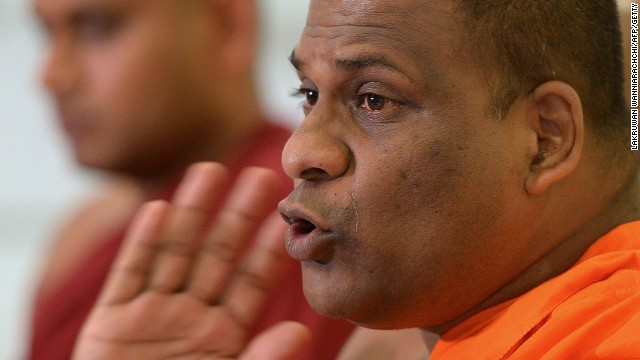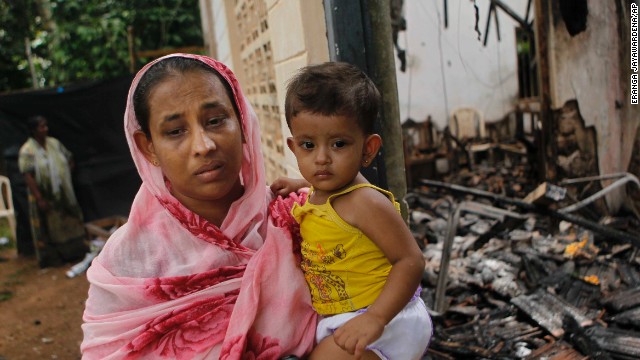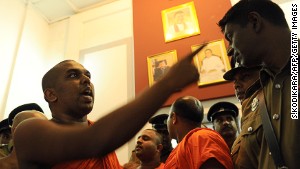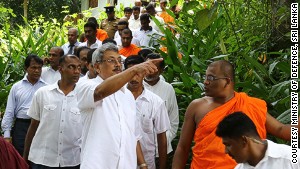Latest News
-
Anti-terrorism Bill will be changedThe highly controversial Antiterrorism Bill is subject to amendments and changes in Parliament and as such no one should have any fear or feeling of threat from the proposed Bill, Justice Minister Dr. Wijeyadasa Rajapakshe said. The government is aware of concerns raised by the global and local community on certain provisions contained in the draft of the Anti-terrorism Bill and the Government is ready to alleviate them by discussion, compromise and flexibility, he added. Addressing a news conference at the Information Department auditorium, Minister Rajapakshe said the Prevention of Terrorism Act (PTA) passed in 1979 under President J.R. Jayewardene’s rule as a temporary measure to counter the emerging separatist insurgency. The PTA has been misused and exploited by successive Governments since then for their personal and political...Read More...
-
WhatsApp adds option to use the same account on multiple phonesWhatsApp users are no longer restricted to using their account on just a single phone. Today, the Meta-owned messaging service is announcing that its multi-device feature — which previously allowed you to access and send messages from additional Android tablets, browsers, or computers alongside your primary phone — is expanding to support additional smartphones. “One WhatsApp account, now across multiple phones” is how the service describes the feature, which it says is rolling out to everyone in the coming weeks.
Setting up a secondary phone to use with your WhatsApp account happens after doing a fresh install of the app. Except, rather than entering your phone number during setup and logging in as usual, you instead tap a new “link to existing account” option. This will generate a QR...Read More... -
CBK commends Dr. Shafi’s noble gesture of donating past salary to buy essential medicineFalsely accused by racist elements for alleged illegal sterilisation, Kurunegala Teaching Hospital doctor says racism will not take country or organisation forward except make poor people suffer more; calls on all to make Sri Lanka racism-free Former President Chandrika Bandaranaike Kumaratunga has commended Dr. Mohamed Shafi Shihabdeen over his gesture of donating the past salaries amounting to Rs. 2.6 million during his suspension and imprisonment on false charges to buy essential medicines. Chandrika Bandaranaike Kumaratunga
Dr. Mohamed Shafi Shihabdeen
Following...Read More... -
Dr. Shafi donates arrears of his salary to purchase medicines for hospitalsDr. Shihabdeen Mohamed Shafi, the doctor at the Kurunegala Teaching Hospital has decided to donate arrears of his salary amounting over Rs. 2.67 million for the purchase of essential medicines for hospitals.
Dr. Shafi who was on compulsory leave on charges of performing infertility surgery, has received a cheque of over Rs. 2.67 million salary arrears from the Health Ministry last week.
The salary arrears include the basic salary, interim allowance, cost of living, and allowance in lieu of pension for the period of compulsory leave imposed on Dr. Sihabdeen.
Dr. Shafi who was employed at the Kurunegala teaching hospital was arrested on May 25th, 2019, on charges of performing infertility surgery.
On July 25, 2019, the Kurunegala Magistrate’s Court ordered that the doctor be released on bail.Read More...Govt. used Sinhala-Buddhist shield to its maximum benefit Ven. Galkande Dhammananda TheraThis Govt. nurtured thug-like monks promoted them and deployed them in various places Certain monks have severe psychological wounds If society isn’t healed cases of domestic violence, harassment and child abuse will be on the rise Reconciliation was about having workshops, providing a report and earning dollars Accountability has not been included in the Constitution or the Judicial system Terrorism sprouts in a country that has no justice Ven. Galkande Dhammananda Thera who currently heads the Walpola Rahula Institute for Buddhist Studies has been addressing issues related to social justice and harmony while promoting an inclusive and plural society. Having gathered a wealth of experience during the height of war for instance and having encountered various incidents during his lifetime, Ven. Dhammananda Thera has...Read More...Health ministry to pay back-wages for Dr. Shafi before July 10The Ministry of Health today gave an undertaking before the Court of Appeal that the salary and allowances payable to Dr. Shafi Shihabdeen will be paid before July 10 this year. The Ministry of Health gave this undertaking pursuant to a writ petition filed by Dr. Shafi Shihabdeen, who was at the centre of the controversy surrounding the alleged sterilisation of female patients. The Director General of Establishment at the Ministry of Public Services had earlier informed the Court that the basic salary, interim allowance, cost of living and allowance in lieu of pension could be paid to Dr. Shafi Shihabdeen, for the compulsory leave period. Meanwhile, the petitioner expressed willingness to attend the preliminary inquiry before Director of Kurunegala Teaching Hospital Dr. Chandana Kendangamuwa. Taking into consideration the facts,...Read More...Sri Lanka court orders release of lawyer held for two yearsA Sri Lankan court has ordered the release on bail of a lawyer arrested over his alleged links to the 2019 Easter Sunday bombings and held for nearly two years on charges rights groups say lacked credible evidence. Hejaaz Hizbullah was arrested in April 2020 and accused of being linked to the attacks on churches and hotels that left 279 people dead. But after prosecutors failed to provide evidence of his involvement in the attacks, blamed on a local group, he was instead Read More...Hejaaz Hizbullah leaves from remand custodyAttorney-at-law Hejaaz Hizbullah today left from remand custody after fulfilling his bail conditions before Puttlalam High Court.Read More...
He was incarcerated for 22 months for allegedly committing offences come under the Prevention of Terrorism Act.Last Monday (07), the Court of Appeal ordered to release Hizbullah on bail pursuant to a revision application filed on behalf him.Hizbullah was ordered to be released on a cash bail of Rs.100,000 with two sureties of Rs.500,000 by Puttlalam High Court Judge Kumari Abeyratne. He was further ordered to report to the DIG office of Puttalam Police Division every second and fourth Sunday of every month.An indictment under the Prevention of Terrorism Act and the International Covenant on Civil and Political Rights (ICCPR) Act has now been served on Hejaaz Hizbullah. According to the indictment, Hizbullah...හිජාස් ගෙදර යයි
(නිමන්ති රණසිංහ සහ හිරාන් ප්රියංකර ජයසිංහ) ත්රස්තවාදය වැළැක්වීමේ පනත සහ සිවිල් හා දේශපාලන අයිතීන් පිළිබද ජාත්යන්තර සම්මුති පනත ප්රකාරව චෝදනා ලැබ වසර දෙකකට ආසන්න කාලයක් රක්ෂිත බන්ධනාගාර ගත කර සිටි නිතීඥ හිජාස් හිස්බුල්ලා මහතා අභියාචනාධිකරණ නියෝගය ප්රකාරව ඇප මත මුදාහැරීමට පුත්තලම මහාධිකරණය අද (09)...Read More...Court of Appeal grants bail on Hejaaz HizbullahThe Court of Appeal today ordered to release Attorney-at-law Hejaaz Hizbullah on bail after nearly two years in detention and remand custody. Accordingly, the Court of Appeal directed the Puttalam High Court to release Hejaaz Hizbullah on bail with suitable bail conditions. The Court of Appeal two-judge-bench comprising Justice Menaka Wijesundera and Justice Neil Iddawala made this order taking into consideration a revision application filed on behalf of Hejaaz Hizbullah. The Attorney General did not raise objections to release Hizbullah on bail. On January 28, an application made by the defence requesting to release Attorney-at-law Hejaaz Hizbullah on bail was rejected by Puttalam High Court. The High Court Judge Kumari Abeyrathne refused to grant bail citing that she has no jurisdiction to grant bail under the Prevention of Terrorism...Read More...- 1
- 2
- 3
- 4
- 5
- 6
- 7
- 8
- 9

- An ultra-nationalist Buddhist group has been campaigning against Muslims in Sri Lanka
- The Bodu Bala Sena is blamed by many for inciting religious riots that left 3 Muslims dead
- A month on, a monk who gave an inflammatory speech before the riots has not been charged
- Observers say it appears the group is operating with impunity, fueling the fears of minorities
(CNN) -- Shortly before Buddhist mobs made a deadly rampage through Muslim neighborhoods near the town of Aluthgama, Sri Lanka last month, a man with cropped hair and glasses stood before expectant crowds to deliver an explosive speech.
Video footage of the rally, called following a traffic altercation between Muslim youths and a Buddhist monk in the coastal town, captures the speaker in full flight.
In a pointed reference to the security forces stationed nearby, he declares that the Sri Lankan police and army are Sinhalese, the mostly Buddhist ethnic majority that accounts for three-quarters of the island's 20 million people.
Then, his arm raised and his voice rising to a shriek, he issues an explicit threat to Muslims, using a derogatory term for the minority.
To roars of approval, he vows that if any Muslim, were to lay a hand on a Sinhalese -- let alone a monk -- that would "be the end" of all of them.
 In pictures: Deadly riots in Sri Lanka
In pictures: Deadly riots in Sri LankaWhat is striking about the clip, aside from the viciousness of the rhetoric, is that the firebrand behind the microphone is dressed in the saffron robes of a Buddhist monk.
He is Galagoda Aththe Gnanasara, the Buddhist holy man who is the general secretary and public face of the Bodu Bala Sena (BBS, also known as Buddhist Power Force).
The ultra-nationalist Sinhalese Buddhist organization has emerged as a troubling presence on the Sri Lankan political landscape in recent years, and is blamed by many for inciting the deadly violence in Aluthgama.
"It was already a tricky situation," said Mohamed Hisham, a social media activist and businessman, who was raised in Dharga Town, a Muslim neighborhood near Aluthgama that bore the brunt of the violence.
"But I believe the presence (of the BBS) had a major impact. They are to be blamed for inciting what happened."
Nights of terror
Mohamed Hisham, who grew up in ransacked Muslim neighborhood
What happened, according to witnesses and officials, is that shortly after the speech, Buddhist mobs marched through Muslim neighborhoods, ransacking dozens of homes and shops. Three Muslim men were killed, and sixteen seriously injured in the two nights of violence that followed, police said.
One month on from the violence, described as the worst attacks on Muslims in the country in years, 135 people have been arrested, police say.
But while Gnanasara has given a statement to police about the events of the day, he has yet to face any charges. A national police spokesman said officers were still considering whether he had played a role in inciting the violence. "We need to check whether he has provoked the men by making this speech," he said.
The facts that the BBS's chief demagogue walks free, that authorities allowed the rally to proceed, and that they failed to prevent the violence have created an impression that the group operates with impunity, said Hisham, fueling the fears of Muslims.
"The community is feeling that if they can go scot-free after causing this kind of mayhem, what lies ahead?"
For his part, Gnanasara rejected the suggestion that the BBS was in any way culpable for the violence, telling CNN at the group's Colombo headquarters that it had "no involvement" in the incidents at Aluthgama.
Galagoda Aththe Gnanasara, BBS general secretary
"On the contrary, our organization was trying to defuse the tension after a monk was assaulted by a group of Muslim youths," he said. "We continue to be blamed for the incidents and portrayed as Sinhala extremists. This is unfair and incorrect."
Gnanasara was among a group of monks that visited the Ministry of Mass Media and Information Wednesday to file a complaint about news coverage of the Aluthgama incident, alleging the reports had disrespected Buddhism, Sri Lankan media reported.
In an earlier statement on the BBS's website -- prompted by the cancellation of Gnanasara's U.S. visa in the aftermath of Aluthgama -- the group condemned the violence there, but acknowledged that BBS representatives had "delivered emotional speeches emphasizing the need to protect Sinhala Buddhists, who are actually a very small global minority."
'Saffron fascism'
Others believe concerns about the BBS are well founded.
Dayan Jayatilleke, a political scientist and former Sri Lankan diplomat, referred to the group's politics as "saffron fascism" and described it as "a wholesaler of the ideology of hate, especially Islamophobia."

While the BBS remained a fringe movement, he said, it appeared to be gaining influence among Buddhist clergy. "(The BBS) have to be taken very seriously indeed."
Paikiasothy Saravanamuttu, executive director of Sri Lanka's Centre for Policy Alternatives, believed the group, which he described as a purveyor of "classic hate speech," had become emboldened by the lack of censure over the events at Aluthgama.
"Their more violent or aggressive demonstrations of power, involving even criminal acts, have gone unpunished," he told CNN.
"They seem to have a lot of support, if not protection, from within the regime itself."
He added that there had been insufficient denunciation of the group, both from Buddhist authorities and the state.
"Disciplinary action should be taken from within the priesthood against people who are, in the name of Buddhism, violating every single thing that Buddhism stands for."
Militant Buddhism
Along with their co-religionists in Myanmar -- where a monk-led anti-Muslim group, the 969 Movement, has been blamed for instigating deadly clashes -- Sri Lanka's Buddhists were the subject of a recent plea from the Dalai Lama during a speech on his birthday, calling on them to desist from violence against Muslims.
How is it that Buddhist monks -- exponents of a religion associated with peace and non-violence -- have come to be viewed as hate merchants?
Paikiasothy Saravanamuttu, executive director, Centre for Policy Alternatives
Jayatilleke said that the rise of militant Buddhism should not be surprising. There had been a "fanatical strain running through Sinhala Buddhism for years," he said. One prime minister, S. W. R. D. Bandaranaike, was assassinated by a monk in 1959.
"In the history of religions, you have long periods of perversion of the ideals of the original founder," he said.
Formed in 2012, the Bodu Bala Sena was born as a vehicle to more stridently defend Sinhalese Buddhism, when Gnanasara and a fellow monk broke away from another monk-led Sinhalese nationalist party, the Jathika Hela Urumaya (JHU). Gnanasara had previously run as a political candidate for the JHU, a member of President Mahinda Rajapaksa's ruling alliance.
Since its formation, the group has campaigned on issues including alleged poor treatment of Sri Lankan Buddhists working in the Middle East, Christian evangelization, anti-Buddhist riots in Bangladesh and hotels featuring "Buddha bars" popular with foreign tourists, often storming venues in organized "direct actions" to make its point.
Islam targeted
But overwhelmingly its target has been Sri Lanka's Muslim community, which accounts for about 10% of the population.
Issues raising its ire have included halal certification, the burqa, mosque construction, Islamic conversion and alleged Islamic militancy -- in a country with no history of domestic Islamic extremism. So why are Muslims suddenly in the cross-hairs?
Jayatilleke said that anti-Muslim sentiment within the Buddhist clergy had only arisen since 2009, when the 25-year civil war between the government and separatist Tamil rebels ended.
Dayan Jayatilleke, political scientist
"When the war was over, the Sinhalese looked around and found that while the two major communities were bashing each other, the Muslims had been at peace and had prospered," he said. "They found more mosques, stores, better educated young Muslims -- a changed profile after years of war. And they lashed out."
Saravanamuttu said the BBS's anti-Muslim rhetoric tapped into concerns about global jihadism, an "atavistic fear" of high Muslim birth rates and resentment of the perceived success of the Muslim business community.
It fed into a dominant ideology of aggressive Sinhalese Buddhist nationalism that was also pushed by the government, as a way of making itself seem "eternally relevant and needed," he said.
"It's a range of arguments to make the Muslims into 'the other' and say that the Sinhala nation is under threat and requires protection," he said.
Official protection?
The leeway the BBS has been given to carry out its activities has led many to speculate it must be operating with a degree of official sanction.

But the question of how closely the BBS is tied, if at all, to Sri Lanka's government is murky.
The most powerful figure often associated with movement is Gotabaya Rajapaksa, the Secretary of Defense and the president's brother, who officially opened an academy linked to the BBS in Galle last year where he was photographed with Gnanasara, said Jayatilleke.
He had also spoken in support of the JHU, the BBS's allies, Jayatilleke said.
"Gotabaya Rajapaksa has been patronizing or been associated with the Sinhala religious right even before the BBS," he said.
But Brig. Ruwan Wanigasooriya, spokesman for the Ministry of Defence and Urban Development, said Rajapaksa had no relationship whatsoever with the BBS. He had been "more or less" compelled to attend the Galle opening ceremony due an invitation from a respected monk, said Wanigasooriya, and Gnanasara had merely been one among many monks present.
Wanigasooriya said Sri Lanka was a pluralistic democratic country in which religious organizations enjoyed freedom to operate, but that Rajapaksa deplored any form of violence.
Mohan Samaranayake, spokesman for Sri Lankan President Mahinda Rajapaksa, said there was "no protection or special treatment" for the BBS from the government, including Gotabaya Rajapaksa. Anyone who broke the law would face the consequences, he said.
"Even the Bodu Bala Sena general secretary was questioned" over the events that took place in Aluthgama, said Samaranayake. "Investigations are still ongoing. I cannot predict the outcome."
Gnanasara told CNN his organization had no backing from the government or Rajapaksa.
A political dilemma
Jayatilleke said that even if the BBS had once proven of some political benefit to the Rajapaksa regime, it now loomed as a problem.
The type of violence seen in Aluthgama was "completely unproductive as far as the government is concerned," he said.
Indeed, Gnanasara had criticized the president in his Aluthgama speech, claiming that the Sinhalese lacked a leader, in what Jayatilleke said seemed to be a direct appeal "to the Sinhala Buddhist sentiments of the armed forces and police."
Paikiasothy Saravanamuttu, executive director, Centre for Policy Alternatives
The comments, he said, appeared to represent a bid by the Buddhist clergy to position itself "for the leading role in society and the state."
Despite the challenge to his authority, Jayatilleke said President Rajapaksa appeared to have made a calculation not to crack down on the BBS, as to do so ran the risk of triggering rioting, or making martyrs of them to their support base in the security forces.
"He doesn't want to make a hero of this guy. They'll probably box him in rather than lock him up."
Onlookers believe that calculation will carry its own consequences.
Hisham fears the unwarranted accusations of extremism could eventually become a self-fulfilling prophecy, pushing some members of his community in that direction as long as the BBS and its supporters were free to target them with impunity.
And Saravanamuttu predicted that in the absence of any censure, an emboldened BBS would only escalate its activities.
"Impunity breeds further violation," he said. "If this is a country of law, it needs to be brought to bear on whoever breaks it -- irrespective of whether they're in robes or not."
Journalist Iqbal Athas in Sri Lanka contributed to this report.
http://edition.cnn.com/2014/07/17/world/asia/sri-lanka-bodu-bala-sena-profile/index.html?hpt=hp_c4
| < Prev | Next > |
|---|





